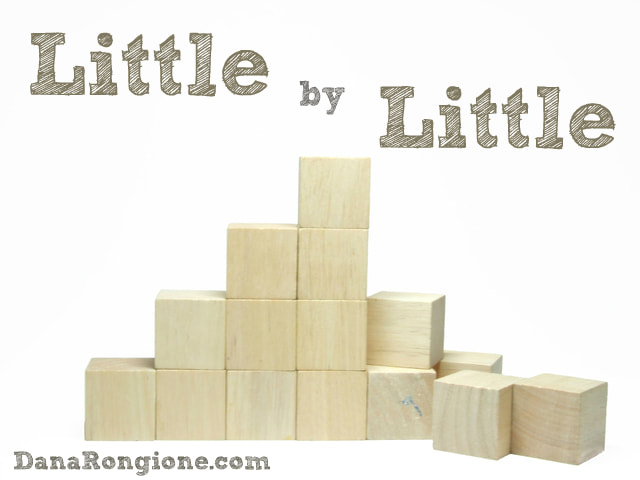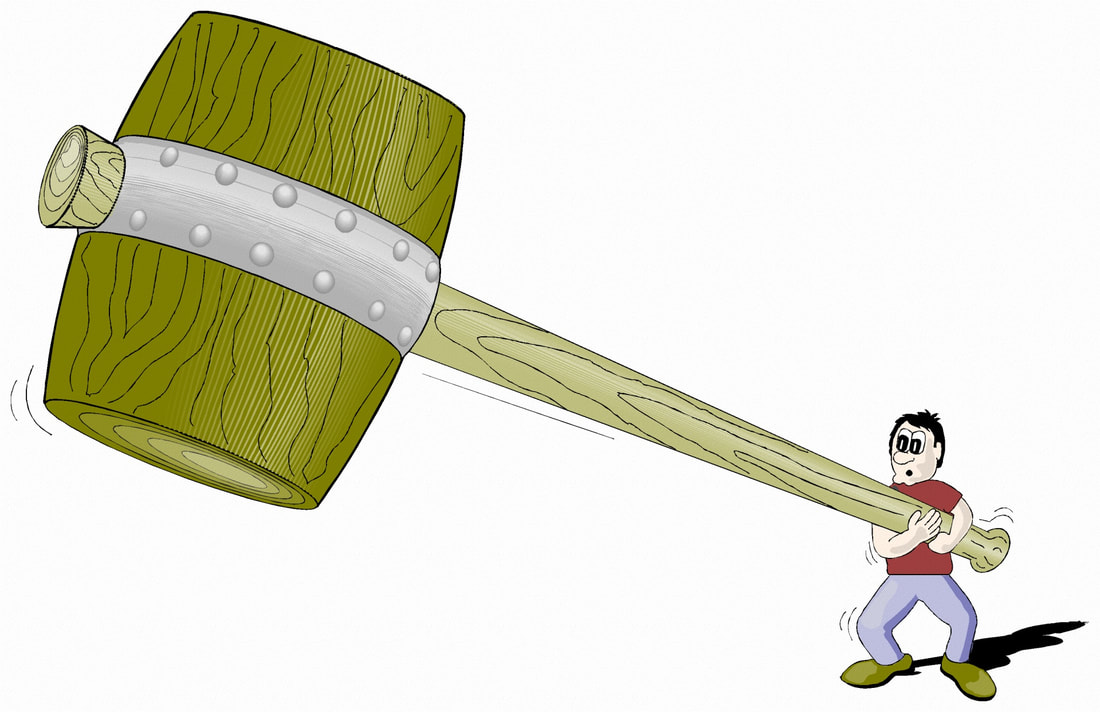Do you ever sell yourself short and believe others are doing the same? You think you're disorganized or scatterbrained, so surely, everyone else thinks the same thing. You believe you don't have what it takes to accomplish a goal, and one glance around tells you that everyone else feels the same about you. But you know what? We're usually wrong—not only in what we believe but also in what we think others believe, just like the children of Israel.
And they brought up an evil report of the land which they had searched unto the children of Israel, saying, The land, through which we have gone to search it, is a land that eateth up the inhabitants thereof; and all the people that we saw in it are men of a great stature. And there we saw the giants, the sons of Anak, which come of the giants: and we were in our own sight as grasshoppers, and so we were in their sight. (Numbers 13:32-33)
This is a familiar account in the story of the Exodus. After about two years of journeying in the wilderness, the children of Israel finally arrived at the Promised Land. The land of which they had been dreaming all their lives. The land God had promised to give them. As soon as they arrived at the border, Moses sent in twelve spies to see what the land was like and what they were up against. Forty days later, the spies came back with their report. The land flowing with milk and honey was far better than they had expected, but it was occupied by mean, BIG enemies. According to ten of the spies, there was no way they could take the land, but Caleb and Joshua had a different story to tell. They understood that it wasn't up to them to "take" the land, for God had already promised to give it to them. All they had to do was act in faith and accept what God was giving.
But the other ten spies were adamant about what they had seen. Notice the last phrase of verse 33: we were in our own sight as grasshoppers, and so we were in their sight. Well, that's an interesting statement, isn't it? Not so much the first part. I can see where that would be an appropriate response, but the last part: so we were in their sight. How did they know what the enemy thought of them? They were supposed to be spying, which means hiding or, at the very least, not drawing attention to themselves. If they did that, the enemy would have never noticed them let alone told the Israelites what they thought of them. This reaction was nothing more than fear. Yep, anxiety had them believing that the enemy thought the children of Israel were as insignificant and powerless as they believed themselves to be. They had the attitude, "We're weak and no match for the trials ahead. Everybody says so." But everybody didn't say so. Only they did, and I can prove it.
If we jump over to the story of Jericho, we'll see what the inhabitants of the Promised Land thought of the children of Israel. Let's look at Joshua 2:9-11 and see what Rahab told the two spies who searched out the land at that time.
And she said unto the men, I know that the Lord hath given you the land, and that your terror is fallen upon us, and that all the inhabitants of the land faint because of you. For we have heard how the Lord dried up the water of the Red sea for you, when ye came out of Egypt; and what ye did unto the two kings of the Amorites, that were on the other side Jordan, Sihon and Og, whom ye utterly destroyed. And as soon as we had heard these things, our hearts did melt, neither did there remain any more courage in any man, because of you: for the Lord your God, he is God in heaven above, and in earth beneath.
Terror has fallen on us.
Our hearts melted.
No more courage.
Hmm, it sounds like the people of Canaan were more scared of Israel than the other way around. They were terrified, waiting for the day when this great host would come and destroy them. So, how is it that the enemy was so frightened while, at the same time, Israel felt they didn't have a chance? It's easy to "see." Notice the statement from the children of Israel again.
The people that we saw.
We saw giants.
We were in our own sight.
So we were in their sight.
What were they looking at? The enemy and themselves. No wonder they were afraid. The enemy looked so big and bad, and the situation seemed impossible. But now, look back with me at Rahab's statement.
The Lord hath given you the land.
The Lord dried up the water for you.
The Lord is God in heaven above and on earth beneath.
Interestingly enough, while God's people were looking to themselves and the enemy, the enemy was watching God. They saw what God was doing, and it scared them senseless. If the people had believed Caleb and Joshua, the Israelites could have marched into the Promised Land and said, "Boo!" and sent half the crowd running. That was how much faith and fear of the Lord the enemy had. Unfortunately, the children of Israel had more faith in what they thought the enemy believed about them, and it cost them the Promised Land.
Don't lose your Promised Land because you're convinced you have the enemy figured out. Who knows? They may be more scared of you than you are of them. You'll never know unless you press on, looking to God, not the enemy or the circumstances. Look at what God is doing and what He has done for you in the past. Have more faith in the God who slays giants than in the grasshopper mentality that says you're not good enough. Only then will you reach your Promised Land.
*Here's one of my favorite songs that really drives home the point of today's lesson*
And they brought up an evil report of the land which they had searched unto the children of Israel, saying, The land, through which we have gone to search it, is a land that eateth up the inhabitants thereof; and all the people that we saw in it are men of a great stature. And there we saw the giants, the sons of Anak, which come of the giants: and we were in our own sight as grasshoppers, and so we were in their sight. (Numbers 13:32-33)
This is a familiar account in the story of the Exodus. After about two years of journeying in the wilderness, the children of Israel finally arrived at the Promised Land. The land of which they had been dreaming all their lives. The land God had promised to give them. As soon as they arrived at the border, Moses sent in twelve spies to see what the land was like and what they were up against. Forty days later, the spies came back with their report. The land flowing with milk and honey was far better than they had expected, but it was occupied by mean, BIG enemies. According to ten of the spies, there was no way they could take the land, but Caleb and Joshua had a different story to tell. They understood that it wasn't up to them to "take" the land, for God had already promised to give it to them. All they had to do was act in faith and accept what God was giving.
But the other ten spies were adamant about what they had seen. Notice the last phrase of verse 33: we were in our own sight as grasshoppers, and so we were in their sight. Well, that's an interesting statement, isn't it? Not so much the first part. I can see where that would be an appropriate response, but the last part: so we were in their sight. How did they know what the enemy thought of them? They were supposed to be spying, which means hiding or, at the very least, not drawing attention to themselves. If they did that, the enemy would have never noticed them let alone told the Israelites what they thought of them. This reaction was nothing more than fear. Yep, anxiety had them believing that the enemy thought the children of Israel were as insignificant and powerless as they believed themselves to be. They had the attitude, "We're weak and no match for the trials ahead. Everybody says so." But everybody didn't say so. Only they did, and I can prove it.
If we jump over to the story of Jericho, we'll see what the inhabitants of the Promised Land thought of the children of Israel. Let's look at Joshua 2:9-11 and see what Rahab told the two spies who searched out the land at that time.
And she said unto the men, I know that the Lord hath given you the land, and that your terror is fallen upon us, and that all the inhabitants of the land faint because of you. For we have heard how the Lord dried up the water of the Red sea for you, when ye came out of Egypt; and what ye did unto the two kings of the Amorites, that were on the other side Jordan, Sihon and Og, whom ye utterly destroyed. And as soon as we had heard these things, our hearts did melt, neither did there remain any more courage in any man, because of you: for the Lord your God, he is God in heaven above, and in earth beneath.
Terror has fallen on us.
Our hearts melted.
No more courage.
Hmm, it sounds like the people of Canaan were more scared of Israel than the other way around. They were terrified, waiting for the day when this great host would come and destroy them. So, how is it that the enemy was so frightened while, at the same time, Israel felt they didn't have a chance? It's easy to "see." Notice the statement from the children of Israel again.
The people that we saw.
We saw giants.
We were in our own sight.
So we were in their sight.
What were they looking at? The enemy and themselves. No wonder they were afraid. The enemy looked so big and bad, and the situation seemed impossible. But now, look back with me at Rahab's statement.
The Lord hath given you the land.
The Lord dried up the water for you.
The Lord is God in heaven above and on earth beneath.
Interestingly enough, while God's people were looking to themselves and the enemy, the enemy was watching God. They saw what God was doing, and it scared them senseless. If the people had believed Caleb and Joshua, the Israelites could have marched into the Promised Land and said, "Boo!" and sent half the crowd running. That was how much faith and fear of the Lord the enemy had. Unfortunately, the children of Israel had more faith in what they thought the enemy believed about them, and it cost them the Promised Land.
Don't lose your Promised Land because you're convinced you have the enemy figured out. Who knows? They may be more scared of you than you are of them. You'll never know unless you press on, looking to God, not the enemy or the circumstances. Look at what God is doing and what He has done for you in the past. Have more faith in the God who slays giants than in the grasshopper mentality that says you're not good enough. Only then will you reach your Promised Land.
*Here's one of my favorite songs that really drives home the point of today's lesson*






 RSS Feed
RSS Feed
